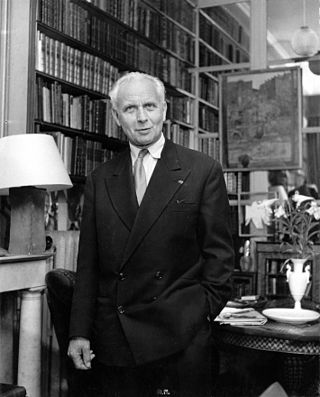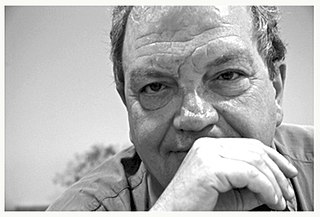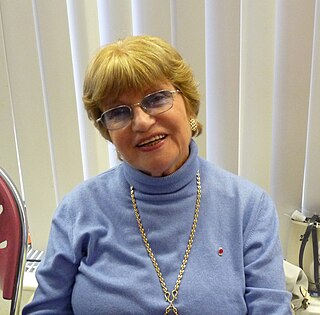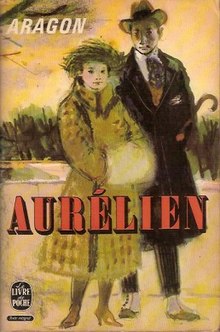
Louis Aragon was a French poet who was one of the leading voices of the surrealist movement in France. He co-founded with André Breton and Philippe Soupault the surrealist review Littérature. He was also a novelist and editor, a long-time member of the Communist Party and a member of the Académie Goncourt. After 1959, he was a frequent nominee for the Nobel Prize in Literature.

Marie-France Pisier was a French actress, screenwriter, and director. She appeared in numerous films of the French New Wave and twice earned the national César Award for Best Supporting Actress.

Count Jean Bruno Wladimir François-de-Paule Lefèvre d'Ormesson was a French writer and novelist. He authored forty books, was the director of Le Figaro from 1974 to 1977, as well as the dean of the Académie Française, to which he was elected in 1973, until his death, in addition to his service as president of the International Council for Philosophy and Humanistic Studies within UNESCO (1992–1997).

Marie-José Benhalassa, known professionally as Marie-José Nat, was a French actress. Among her notable works in cinema were the sequel films Anatomy of a Marriage: My Days with Jean-Marc and Anatomy of a Marriage: My Days with Françoise (1963), directed by André Cayatte. In 1974, she received a Cannes Film Festival Award for Best Actress for her performance in the film Violins at the Ball.

Danielle Frida Hélène Boccara was a French singer of Italian descent, who performed and recorded in a number of languages, including French, Spanish, English, Italian, German, Dutch and Russian.

Gaston Ghrenassia , known by his stage name Enrico Macias, is a French singer, songwriter and musician of Algerian Jewish descent.

Michel Déon was a French novelist and literary columnist. He published over 50 works and was the recipient of numerous awards, including the Prix Interallié for his 1970 novel, Les Poneys sauvages. Déon's 1973 novel Un taxi mauve received the Grand Prix du roman de l'Académie française. His novels have been translated into numerous languages.
In 1977 and 1979, several petitions were signed by a number of prominent French intellectuals, doctors, and psychologists calling for reforms to or the abolition of the French age of consent law. A January 1977 petition published in Le Monde criticized the Affaire de Versailles—the detention of three men arrested for non-violent sex offences against children aged 12–13. A May 1977 petition addressed at the French Parliament called for the equalization of homosexual and heterosexual ages of consent. A 1979 petition published in Libération defended a man arrested for sexual relations with girls aged 6–12.

Étienne Drapeau is a Canadian former ice hockey player. He played as a centre in QMJHL, ECHL, AHL, UHL and WCHL leagues and was selected 99th overall by the Montreal Canadiens in the 4th round of the 1996 NHL Entry Draft.

Muriel is a 1963 French psychological drama film directed by Alain Resnais, and starring Delphine Seyrig, Jean-Pierre Kérien, Jean-Baptiste Thiérrée, and Nita Klein. Its plot follows a middle-aged widow in Boulogne-sur-Mer and her stepson—recently returned from military service in the Algerian War—who are visited by her ex-lover and his new young girlfriend.
Françoise Pichard, also known as Chard and Pscharr, is a French far-right political cartoonist and illustrator of children books.
Marianne Oswald was the stage name of Sarah Alice Bloch, a French singer and actress born in Sarreguemines in Alsace-Lorraine. She took this stage name from a character she much admired, the unhappy Oswald in the Ibsen play Ghosts. She was noted for her hoarse voice, heavy half-Lorraine, half-German accent, and for singing about unrequited love, despair, sadness, and death. She sang the songs of Kurt Weill and Bertolt Brecht. She was friends with Jean Cocteau, Jacques Prévert, François Mauriac, and Albert Camus. In fact, the text for one of her album covers was written by Camus. She was an inspiration for the composers Francis Poulenc and Arthur Honegger.

Agnès Desarthe is a French novelist, children's writer and translator.

Tournée Européenne 2013 was the tenth concert tour by Canadian singer Celine Dion. The tour was organized to support the highly successful fourteenth French-language and twenty-fourth studio album Sans attendre (2012), which has sold more than 1.5 million copies worldwide. It also served as initial promotion for Dion's then recently-released English album Loved Me Back to Life (2013), since she incorporated a few songs from this album to the concert's setlist. It was Dion's first dedicated Francophone tour since the D'eux Tour in 1995–1996. With only ten concerts performed, it was also the shortest tour of Dion's career. Overall, the tour grossed an estimated $20 million from nine shows in Europe. The tour would also mark as the final concert tour for the majority of Dion's longtime touring band members consisting of musical director Claude "Mego" Lemay, guitarist André Coutu, keyboardist Yves Frulla, bassist Marc Langais, and violinist Jean-Seb Carré.
Maurice Laissant Began his career working for the French national railway company before taking a job as a sales representative. He became progressively more widely known as a militant anarchist individualist, free thinker and pacifist. He was a co-founder in 1953 of the newly regrouped Paris based Anarchist Federation.
Françoise Dorner is a French actress, screenwriter, author of plays and novels.

Hugo Boris, is a French writer.

Mathieu Bénézet was a French writer and poet.
Marc Cholodenko, is a French novelist, translator, poet, screenwriter and dialoguist.

Françoise Andrée Renée Dorin was a French actor, comedian, novelist, playwright and songwriter. She was most successful in the 1970s, authored about 30 plays and more than 25 books as well as writing songs for various artists. Dorin wrote the song N'avoue jamais which was performed by Guy Mardel on behalf of France at the Eurovision Song Contest 1965. She was appointed Commandeur of the Légion d'honneur, the Officier of the Ordre des Arts et des Lettres and the Grand officier de l’ordre national du Mérite. A street in Paris' 17th arrondissement was voted unanimously by the Council of Paris to be named after Dorin following her death.














